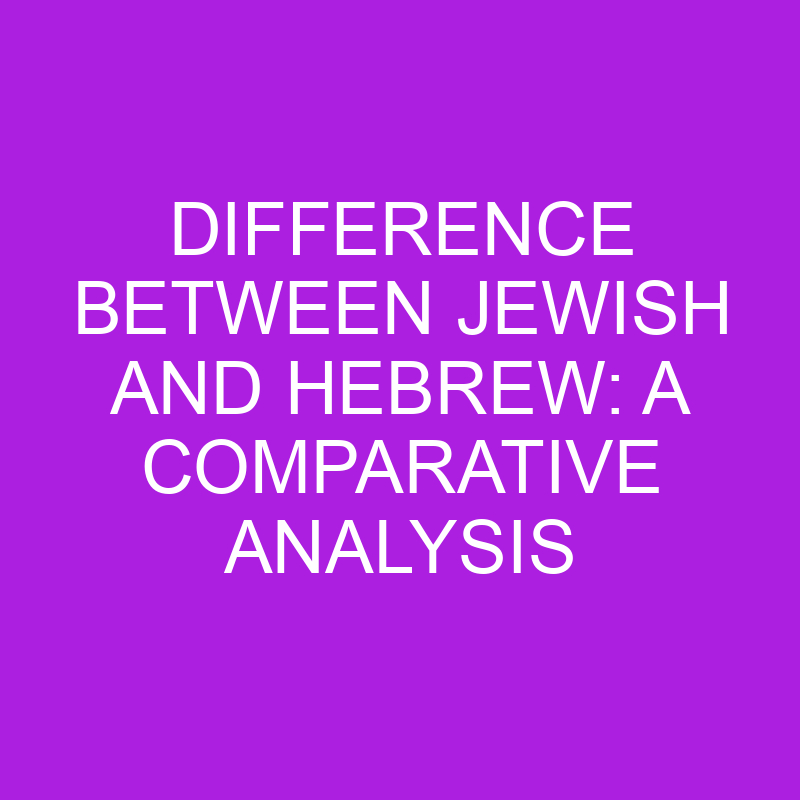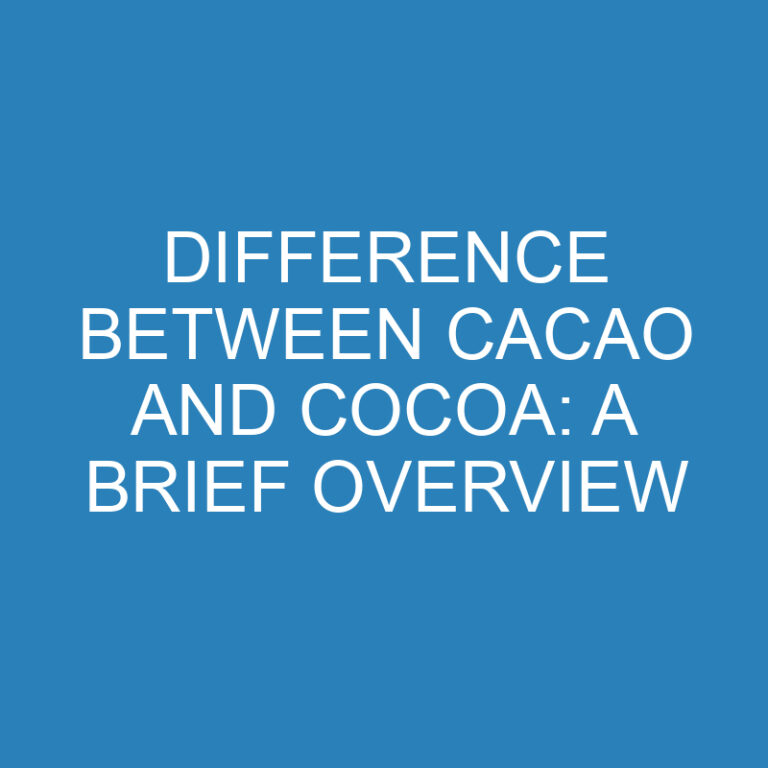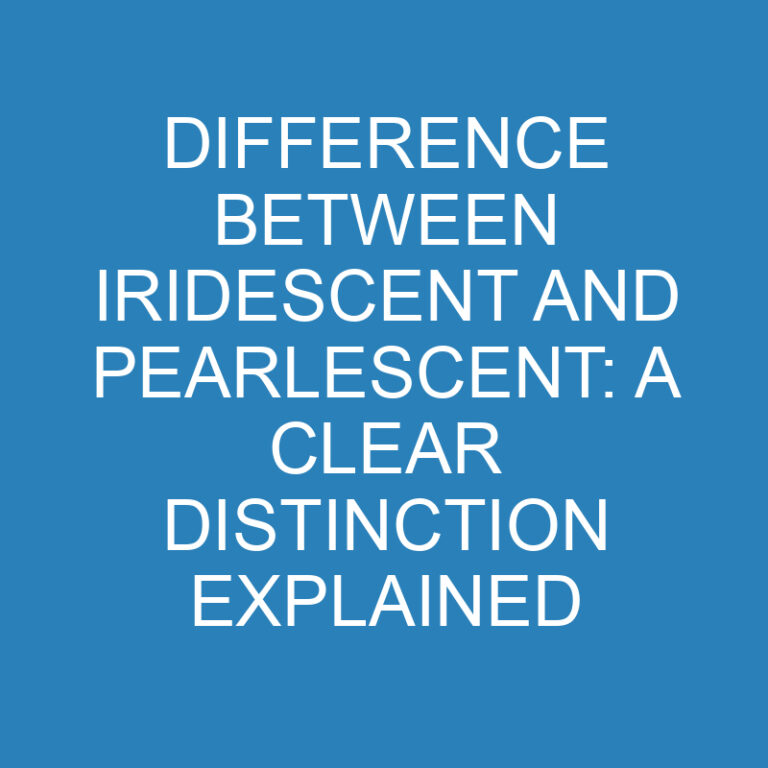
Wondering about the difference between Jewish and Hebrew? Well, let me shed some light on this intriguing topic. While Jewish refers to a religious and cultural identity, Hebrew is a specific language that holds great significance within the Jewish community.
Jewish encompasses those who identify with Judaism as their religion, culture, or both. It is an inclusive term that encompasses individuals from various ethnic backgrounds who practice Judaism or are connected to the Jewish people in some way. Judaism is one of the oldest monotheistic religions in the world and has a rich history spanning thousands of years.
On the other hand, Hebrew is a Semitic language closely associated with Jewish tradition and scripture. It serves as a sacred language in religious rituals and ceremonies for Jews around the world. Hebrew has its roots in ancient times and continues to be spoken by many today, particularly in Israel where it is an official language alongside Arabic.
Post Contents
History of Jewish and Hebrew
The history of Jewish and Hebrew is a fascinating journey that spans thousands of years. It’s important to understand their distinct origins and evolution in order to appreciate the rich cultural heritage they represent.
- Ancient Origins: Hebrew Hebrew is one of the oldest known languages, with roots dating back to ancient times. It originated as a Semitic language spoken by the Israelites in the region now known as Israel and Palestine. The earliest evidence of written Hebrew can be traced back to around 1000 BCE, during the time of King David.
- The Jewish People: The term “Jewish” refers to both a religious group and an ethnic community connected by shared beliefs, customs, and traditions. The history of the Jewish people begins with the story of Abraham, who is considered the father of Judaism. According to biblical accounts, Abraham made a covenant with God, establishing a special relationship between his descendants (the Israelites) and God.
- Biblical Times: During biblical times, Hebrew was not only a spoken language but also served as the medium for sacred texts such as the Torah (the first five books of the Bible). These scriptures played a vital role in shaping Jewish identity, laws, and rituals.
- Diaspora: In ancient times, due to various conquests and exiles, many Jews were scattered throughout different parts of the world in what is known as diaspora. This led to significant linguistic variations within Jewish communities as they adapted their language while preserving their religious practices.
- Revival: Despite centuries of diaspora, Hebrew remained alive through prayers and scholarly study but was not commonly used in everyday conversations among Jews worldwide until recent times. In the late 19th century, there was a movement called Zionism which sought to establish a homeland for Jews in Palestine (modern-day Israel). As part of this effort towards national revival, modern Hebrew evolved from its ancient roots and became the official language of Israel in 1948.
Understanding the history of Jewish and Hebrew provides insights into the cultural, religious, and linguistic aspects that have shaped these identities. From ancient origins to modern revival, their journey is a testament to resilience and unyielding traditions.
The Jewish People
When discussing the difference between Jewish and Hebrew, it is important to understand the concept of the Jewish people. The term “Jewish” refers to individuals who identify with Judaism as their religion, culture, or both. It encompasses a diverse group of people from various ethnic backgrounds and geographic locations.
One significant aspect of the Jewish people is their shared history and heritage. They trace their origins back to ancient Israelites who lived in the region known as Canaan, which is present-day Israel and Palestine. Throughout history, Jews have faced challenges such as exile, persecution, and diaspora. Despite these hardships, they have managed to preserve their unique traditions and customs.
Religion plays a central role in defining the identity of the Jewish people. Judaism is one of the oldest monotheistic religions in the world and serves as a guiding force for many Jews. It encompasses beliefs, rituals, laws (known as Halakha), and moral principles that shape individual and communal life. Observance of religious practices like observing Shabbat (the Sabbath), celebrating holidays such as Passover or Hanukkah, studying Torah (holy scriptures), and engaging in acts of tzedakah (charitable deeds) are integral parts of being Jewish.
Cultural expressions also contribute to the richness of Jewish identity. Literature, art, music, cuisine, language (including Hebrew), storytelling traditions – all play a part in shaping Jewish culture across different regions where Jews reside.
It’s worth noting that not all Hebrew-speaking individuals are necessarily considered part of the Jewish people. Hebrew is an ancient Semitic language that has been revived as modern Israeli-Hebrew spoken today in Israel by Jews and non-Jews alike.
Understanding the complexity and diversity within the Jewish people helps shed light on its significance worldwide. From historical roots to religious practices to cultural expressions – this collective identity continues to evolve while maintaining its strong sense of connection among adherents around the globe.
Jewish Language: Hebrew
When exploring the rich tapestry of Jewish culture, it’s essential to delve into the language that has been an integral part of Jewish identity for centuries: Hebrew. Hebrew is not only the official language of Israel but also holds deep historical and religious significance within Jewish communities worldwide.
Hebrew, a Semitic language, has its roots dating back thousands of years. It is believed to have originated in ancient times and was spoken by the Israelites during biblical periods. Over time, Hebrew evolved from a purely liturgical language to a modern vernacular used in day-to-day life.
One unique aspect of Hebrew is its connection to Judaism. In Jewish religious texts such as the Torah and Talmud, Hebrew remains the primary language used for study and worship. This connection between the language and religion reinforces its importance among Jews as a means to preserve tradition and spiritual heritage.
The revival of Hebrew as a spoken language in modern times is another fascinating aspect. At one point in history, Hebrew was primarily used for religious purposes rather than daily communication. However, through dedicated efforts led by scholars like Eliezer Ben-Yehuda in the late 19th century, Hebrew underwent a renaissance and was ultimately revived as a living language.
Today, millions of people around the world speak Modern Hebrew fluently. It serves as an essential tool for fostering cultural cohesion within Jewish communities globally while also enabling communication with fellow Israelis on both personal and professional levels.
Origins of Hebrew
So, let’s dive into the fascinating origins of Hebrew. It’s a language that holds immense historical and cultural significance for the Jewish people. Here are some key points to help you understand its rich beginnings:
- Ancient Roots: Hebrew is an ancient Semitic language that dates back thousands of years. Its earliest forms can be traced as far back as the second millennium BCE, making it one of the oldest recorded languages in existence.
- Biblical Connection: Hebrew gained prominence through its use in the Hebrew Bible, also known as the Old Testament. This sacred text played a vital role in preserving and transmitting the language across generations.
- Cultural Identity: Hebrew has always been deeply intertwined with Jewish identity and heritage. The revival of spoken Hebrew in modern times has been instrumental in fostering a sense of unity among Jews worldwide.
- Linguistic Development: Over time, Hebrew underwent various linguistic changes and adaptations influenced by different periods and regions where it was spoken. These developments contributed to its evolution into Modern Hebrew, which is widely used today.
- Role in Judaism: Beyond being a spoken language, Hebrew plays a critical role in religious rituals, prayer services, and scholarly discussions within Jewish communities around the world.
- Symbolism and Expression: The beauty of Hebrew lies not only in its words but also in its symbolic meaning and expression within Jewish culture. Each letter carries profound significance, opening doors for interpretation and exploration.
Understanding the origins of Hebrew helps us appreciate its enduring legacy and importance within Jewish history and tradition. As we continue our exploration into Jewish culture, let’s now delve deeper into another intriguing aspect – the difference between Jewish identity and being a speaker of the Hebrew language.
Key Differences Between Jewish and Hebrew
When exploring the rich cultural and religious traditions of Judaism, it’s essential to understand the distinction between being Jewish and speaking Hebrew. While these terms are often used interchangeably, they represent different aspects of Jewish identity. Let’s delve into the key differences between Jewish and Hebrew:
- Ethnicity vs. Language: Being Jewish refers to a person’s ethnicity or heritage, tracing back to the ancient Israelites who originated in the Middle East. It encompasses a diverse range of individuals with various ethnic backgrounds, including Ashkenazi (European), Sephardic (Mediterranean), Mizrahi (Middle Eastern), and more. On the other hand, Hebrew is a Semitic language that holds significant religious and historical importance for Jews worldwide.
- Religious Beliefs vs. Linguistic Identity: Judaism is a religion encompassing a broad spectrum of beliefs, practices, and values held by Jews around the world. It involves adherence to sacred texts such as the Torah, Talmud, and other religious writings. In contrast, Hebrew is primarily viewed as the language in which these sacred texts were written – serving as an integral part of Jewish liturgy, prayer services, rituals, and study.
- Cultural Heritage vs. Communication Tool: Jewish identity extends beyond religious observance; it embraces customs passed down through generations along with unique cultural expressions like music, art forms, culinary traditions, holidays celebrations,and family customs specific to different regions worldwide.The Hebrew language serves as a tool for communication among Jews globally.It connects individuals with their shared history,culture,and enables them to engage in prayers,songs,and conversations related to their faith.
4. Modern Usage vs. Historical Significance: While Hebrew has been spoken for thousands of years,it faced decline during diaspora periods when Jews lived far from their ancestral homeland.However,in modern times,the revival efforts have helped establish Modern Hebrew as an official language in Israel.Today, Hebrew is spoken daily by millions of Jews as their mother tongue or as a second language. Jewish identity, on the other hand, remains deeply rooted in history and cultural heritage, shaping the lives and beliefs of individuals across the globe.
5. Social Identity vs. Linguistic Proficiency: Identifying oneself as Jewish often implies belonging to a social community with shared values, traditions,support systems,and connections.While speaking Hebrew can be an integral part of one’s Jewish identity,it does not define it entirely.Some Jews may not speak Hebrew fluently but still maintain strong ties to their faith,culture,and people.
Understanding the distinction between being Jewish and speaking Hebrew allows us to appreciate the multifaceted nature of Jewish identity. It highlights how religion, language, ethnicity, and culture intertwine to form a rich tapestry that has evolved over centuries. Whether one identifies as Jewish or speaks Hebrew or both,the significance lies in embracing and preserving this remarkable heritage for future generations
Conclusion.
To wrap up, it’s important to clarify the distinction between Jewish and Hebrew. While these terms are often used interchangeably, they have different meanings and refer to different aspects of the Jewish culture and identity.
- Jewish Identity: Being Jewish is primarily a religious or cultural affiliation. It encompasses individuals who follow the Jewish faith or identify with the traditions, customs, and values associated with Judaism. Jews can come from various ethnic backgrounds and can be found in communities around the world.
- Hebrew Language: On the other hand, Hebrew refers specifically to the language spoken by the ancient Israelites and currently serves as the official language of modern-day Israel. It holds deep historical significance for Jews as it has been used in religious texts such as the Torah, prayers, and sacred writings for centuries.
- Cultural Connection: Hebrew plays a crucial role in connecting Jews worldwide through their shared heritage and allowing them to access their religious scriptures directly without relying on translations. Additionally, learning Hebrew is considered an important aspect of preserving Jewish culture.
- Diversity within Judaism: It’s worth noting that Judaism encompasses various denominations such as Orthodox, Conservative, Reform, and Reconstructionist Judaism. Each denomination may have its own unique practices, interpretations of religious texts, and approaches to observance.
- Global Impact: Both Jewish identity and Hebrew have had a significant impact on global history, culture, literature, science, philosophy, art, music – just about every aspect of human civilization has been touched by contributions from people who identify as Jewish or speak Hebrew.
The term “Jewish” pertains to individuals who associate themselves with Judaism either through religion or cultural identification. “Hebrew” refers specifically to the ancient language spoken by Israelites which continues to hold importance in contemporary Israeli society. Understanding these distinctions helps us appreciate the rich diversity within Judaism while recognizing how Hebrew acts as a unifying force among Jews worldwide. Whether you’re exploring the intricacies of Jewish culture, studying ancient texts, or simply curious about the global impact of Jewish people and Hebrew language, delving into these subjects can be a fascinating journey.






